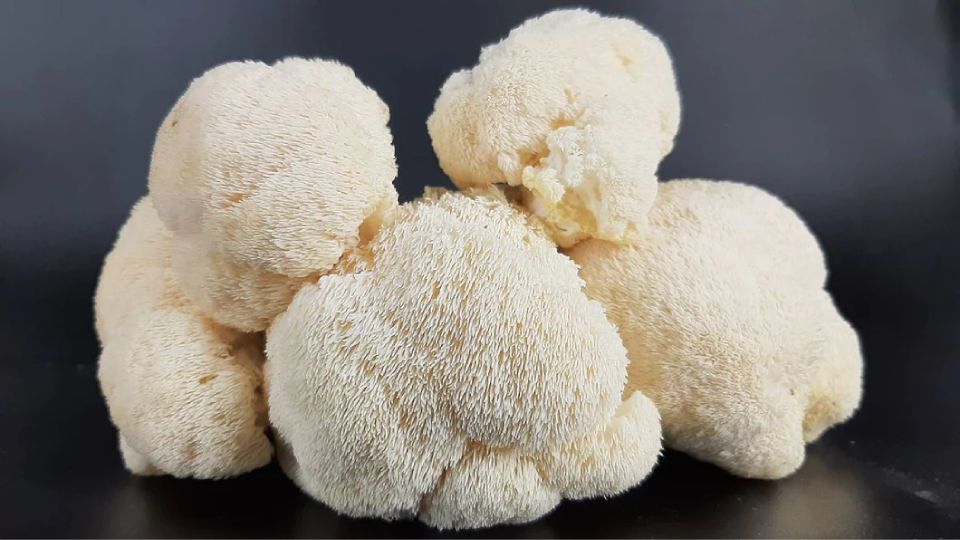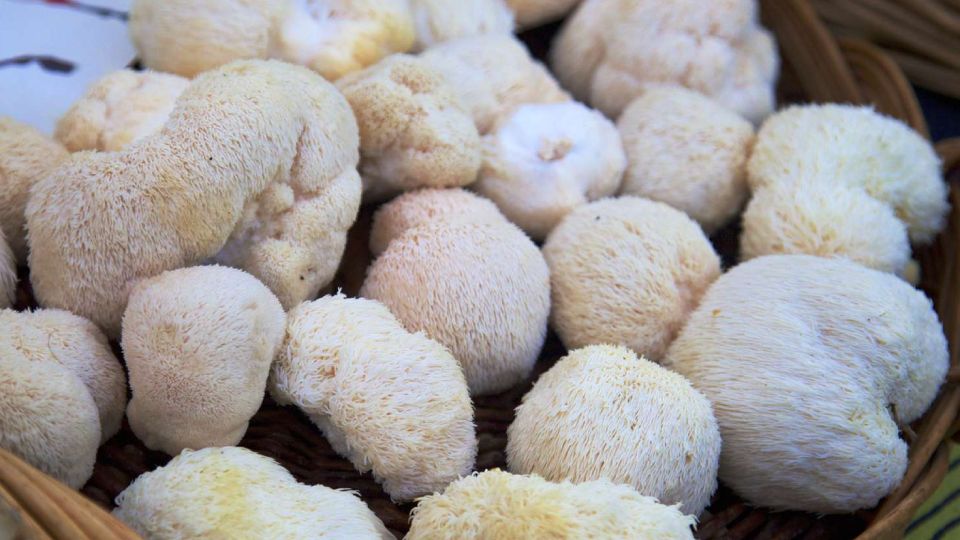When to Take Lion’s Mane: The Best Time for Maximum Benefits
Consumers often ask about when to take Lion’s mane and whether timing impacts its benefits. This article addresses these queries. Lion’s mane, an adaptogen mushroom, has a history in Chinese medicine, supporting brain function and neuron growth. Western scientists are exploring its potential contributions to cognitive function. With its cognitive and immune-boosting properties, the mushroom holds the promise of a brighter and sharper mind.
In this article:
When is the Best Time to Take Lion’s Mane for Maximum Benefits?

Consider your schedule and preferences to determine the ideal time to include lion’s mane in your routine. Ask yourself, “What do I aim to achieve?” Find a consistent time that suits you best and fits into your daily routine for maximum benefits. Let’s explore together how this mushroom affects your body when taken at different times of the day.
Morning – Wake Up Your Brain
Taking the mushroom in the morning can be a great way to start your day. Its energizing effects may help enhance focus, concentration, and mental clarity, setting a positive tone for the rest of the day. Consider incorporating lion’s mane into your breakfast routine for optimal cognitive function throughout the day.
Afternoon – Beat the Afternoon Slump
If you often experience an energy dip or loss of productivity in the afternoon, lion’s mane mushroom can come to your rescue. Consuming it during this time can help combat fatigue, support mental alertness, and boost productivity, allowing you to power through the remainder of your day with vigor.
Evening – Calm the Mind
While lion’s mane is generally energizing, some individuals may find it helpful to take it in the evening to harness its anxiolytic properties. By promoting relaxation and calmness, It can help ease the mind, potentially aiding in a restful night’s sleep. However, it’s essential to listen to your body and determine what works best for you.
Consistency in dosing and monitoring the results is crucial when incorporating lion’s mane mushroom into your routine. It’s advisable to consult with a natural healthcare practitioner or a qualified professional for personalized guidance on dosage and timing.
What is Lion’s Mane Mushroom?
Lion’s Mane mushroom, scientifically known as Hericium erinaceus or yamabushitake, is a remarkable fungus that has captured attention for both its visual allure and medicinal qualities. It typically grows on hardwood trees, particularly in North America, Europe, and Asia. This magnificent mushroom can be found in forests, often appearing like white cascading icicles or a lion’s shaggy mane, hence its evocative name. With a long history of use in traditional Chinese medicine, it continues to captivate researchers and enthusiasts alike due to its potential health benefits and intriguing culinary possibilities[1].
Benefits of Lion’s Mane Mushroom

This mushroom is a treasure trove of health benefits, backed by both traditional wisdom and scientific research. By incorporating fresh lion’s mane mushrooms into your recipes or taking these mushroom supplements, you open yourself up to a world of potential health advantages. It is considered a functional mushroom species, which means it offers more than just nutritional value. Let’s explore the benefits you can expect from consuming this mushroom.
1. Boost Your Immune System with Beneficial Gut Bacteria
Your gut plays a crucial role in bolstering your immune system. When you inhale or consume bacteria, they enter your digestive system. From there, your gut takes charge of combating harmful bacteria and maintaining digestive health. For this task, your gut relies on healthy flora. Enter lion’s mane mushrooms. These mushrooms contain prebiotics that can aid in the production of beneficial bacteria, fostering a thriving gut environment. So, during flu season, these mushrooms can become your best ally, equipping your body with a shield and sword to fend off any potential threats[2].
2. Promote Focus, Clarity, And Memory
Lion’s mane mushrooms can be a great addition to your post-workout routine, as they offer antioxidant support and promote a healthy inflammatory response in your body. This, in turn, may enhance your cognitive function. By incorporating these mushroom supplements into your regimen, you have the potential to support your brain health. You might experience improved focus and a clear-headed feeling throughout the day. Consider them as your caffeine-free morning boost—energizing without the jitters[3].
3. Providing Assistance in Managing Occasional Stress and Low Mood
If you ever find yourself dealing with occasional stress and low mood, it’s essential to have tools at your disposal to manage your body’s response effectively. One tool you can rely on is lion’s mane. By incorporating them into your daily routine, you might discover that it helps you find a better balance in your mindset. You may notice feeling more equipped to handle those occasional off days with greater ease[4].
4. Anti-inflammatory and Antioxidant Properties
Studies have shown that this mushroom possesses potent anti-inflammatory and antioxidant properties, which can help combat oxidative stress in the body. By reducing inflammation and neutralizing harmful free radicals, this mushroom may contribute to overall well-being and support various bodily systems[5].
5. Potential Cancer-Fighting Properties
Preliminary research has shown promising results regarding the potential anti-cancer properties of lion’s mane mushrooms. Some studies suggest that their extract may help inhibit the growth of certain cancer cells and even induce apoptosis, a process that triggers programmed cell death in cancerous cells. However, further research is needed to fully understand its efficacy in cancer treatment[6].
Effects of Lion’s Mane
Taking them can have both immediate and long-term effects on the body and mind. Let’s explore the various ways this remarkable mushroom influences our well-being:
- Immediate Effects – Many individuals report a boost in energy and mental clarity shortly after consuming them. This mushroom is believed to have energizing properties that can help combat fatigue and promote a sense of alertness. Additionally, lion’s mane has been associated with potential anxiolytic effects, which may help alleviate symptoms of anxiety and promote a calm state of mind.
- Long-term Effects – When taken consistently over an extended period, they may offer long-term benefits for your overall health. Its anti-inflammatory properties can help reduce chronic inflammation in the body, which is often linked to various diseases, including heart disease. Moreover, they may support the nervous system and potentially help prevent age-related cognitive decline and memory loss.
Risks and Side Effects
- Allergic Reactions: Can cause allergic reactions in some individuals.
- Bleeding Disorders: May increase bleeding risk in those with bleeding disorders or taking blood-thinning meds.
- Low Blood Pressure: Potential to lower blood pressure, caution for those with low BP.
- Medication Interactions: May interact with drugs like blood thinners or immunosuppressants; consult a healthcare professional before use.
- Skin Irritation: It might cause skin irritation or rash upon direct contact.
- Liver Function: Might affect liver function; caution for individuals with liver conditions.
- Pregnancy and Breastfeeding: Safety during these periods is not established; avoid use unless advised by a healthcare professional.
It’s important to consult with a healthcare professional before starting any new supplement or making significant changes to your diet, especially if you have any pre-existing medical conditions or are taking medications. This table serves as a general guide and is not exhaustive.
How to Incorporate Lion’s Mane into Your Regimen

Incorporating lion’s mane mushrooms into your daily routine is an exciting journey toward improved well-being. Here are some practical tips to help you make the most of this incredible mushroom:
1. Finding High-Quality Supplements
When purchasing lion’s mane supplements, it is crucial to choose reputable brands that prioritize quality and transparency. Look for products that are third-party tested, ensuring purity, potency, and absence of contaminants. Reading customer reviews and seeking recommendations from trusted sources can also help you make an informed decision.
2. Selecting the Right Form
In addition to consuming these mushrooms through food, you have various options when it comes to lion’s mane supplements. The ideal supplement for you is the one that is convenient, enjoyable, and seamlessly fits into your daily routine. Choose a supplement that you can effortlessly incorporate into your daily rituals.
- Capsules – When it comes to lion’s mane, you have multiple supplement options in addition to consuming it through food. The best supplement for you is the one that is convenient, enjoyable, and seamlessly integrated into your daily routine. Look for a supplement that you can effortlessly include in your everyday rituals.
- Powder – If you’re a fan of coffee, smoothies, shakes, and oatmeal, Lion’s mane powder is an excellent choice for you! Enjoy your morning protein smoothie by adding a scoop of mushroom powder for extra goodness. Get creative with this versatile supplement — you can sprinkle it into smoothie bowls, oatmeal, and other recipes.
- Tinctures – For unlimited creativity with your lion’s mane supplements, try using an extract in the form of a tincture. This liquid extract can be easily added to your preferred teas, coffees, and beverages, or even incorporated into your favorite recipes. Enjoy the flexibility and possibilities it brings to your culinary adventures.
- Gummies – If you prefer to avoid the feeling of taking a tablet, lion’s mane gummies can be a delightful alternative for your daily dosage. Gummy vitamins and supplements offer a pleasant flavor and sweet treat experience, making it easier to enjoy the potential health benefits of lion’s mane in a more enjoyable way. Indulge in the convenience and taste of gummies while supporting your well-being.
3. Collaborating with a Natural Healthcare Practitioner
If you have specific health concerns or are unsure about the appropriate dosage, it is advisable to consult with a natural healthcare practitioner. They can provide personalized recommendations based on your individual needs and help you navigate the world of lion’s mane mushrooms effectively.
How Much Lion’s Mane Mushroom Should You Take for Maximum Benefits?
The appropriate amount of lion’s mane mushroom to take depends on your body mass and weight. The good news is that there is no risk of overdosing on these mushrooms, and they are entirely safe to consume even in large quantities.
While there is no established standard dose, research suggests a range of 500 to 3000 milligrams per day for general well-being and cognitive function. However, it is crucial to start with a lower dose and gradually increase it to assess your tolerance and response.
When choosing the mushrooms, it’s crucial to ensure you opt for the fruiting body rather than mycelium on grain. The fruiting body of lion’s mane contains eight classes of compounds that have been extensively studied for their ability to support nerve growth factor (NGF) and cognitive function. These compounds, including Hericinones, Dilinoleoyl-phosphatidylethanolamine (DLPE), amyloban, amycenone, 3-Hydroxyhericenone F, Hericene, Hericerin, and erinacerin, are not present in the mycelium. Additionally, the fruiting body has up to 29 times more 1,3 1,6 beta-glucans compared to the mycelium. On the other hand, mycelium on grain is often diluted, with up to 90% grain filler.
It’s always wise to seek advice from your doctor or health practitioner before starting any new supplement, especially if you have specific allergies or health conditions. Their guidance can help ensure the best approach for incorporating them into your routine.
How Quickly Does Lion’s Mane Take to Work?
Determining the best time of day to take Lion’s Mane involves considering how quickly you feel its effects. If the effects are instantaneous, taking them before bed should be fine. However, if it takes longer for the effects to manifest, it may be better to take it in the morning.
So, it’s important to note that the benefits of these mushrooms differ from those of pharmaceutical drugs. The effects of Lion’s Mane do not occur immediately after digestion but rather build up gradually over an extended period. While you may notice some minor initial improvements in focus, it’s more likely that you’ll have to wait a few weeks before experiencing the full range of benefits.
Ultimately, finding the optimal time to take them may require some experimentation and observation of how your body responds. It’s always advisable to consult with your healthcare provider or a qualified professional to determine the most suitable approach for incorporating Lion’s Mane into your routine.
Should I Take Lion’s Mane on an Empty Stomach?
When it comes to taking Lion’s mane, you have options. You can consume it with food or on an empty stomach. If you have fresh mushrooms, it’s typically enjoyed as part of a meal. On the other hand, the powder, extract, and supplements are commonly taken on an empty stomach, preferably in the morning. This allows for optimal absorption and utilization of the beneficial components. Ultimately, the choice is yours, and you can experiment to see what works best for you.
Can I Take Lion’s Mane Every Day?
The answer is yes, you can take Lion’s mane every day. When you incorporate them into your daily routine, you can experience long-term advantages that become more noticeable over time. This incredible mushroom has been shown to have preventive effects against diabetes and can help alleviate symptoms associated with Parkinson’s disease. So, the longer you use these mushrooms, the more pronounced these benefits can become.
FAQs
Is Lion’s Mane better at night or morning?
Lion’s Mane can be taken in the morning or at night, depending on personal preference. Some people prefer it in the morning for potential cognitive benefits during the day, while others take it at night as part of their evening routine. Choose a time that suits your lifestyle and needs best.
Is it better to take Lion’s Mane at night?
Taking Lion’s Mane at night is a personal choice. Some individuals prefer it before bedtime as it may promote relaxation and better sleep for them. However, it can be taken in the morning too to potentially support cognitive function throughout the day. Tailor your Lion’s Mane intake to your own schedule and needs.
When should you not take lion’s mane?
Avoid Lion’s Mane if you have allergies or sensitivities to mushrooms. Pregnant or nursing individuals should consult a healthcare professional before use. If you’re taking medications or have underlying health conditions, seek medical advice to ensure Lion’s Mane is safe for you, as it may interact with certain medications or medical conditions.
Does Lion’s Mane Give You Energy?
Yes, Lion’s mane gives you energy. It may provide a subtle energy boost by supporting cognitive function and reducing brain fog. While not a stimulant like caffeine, some people report feeling more mentally alert and focused when taking Lion’s Mane, which can indirectly contribute to increased energy levels.
The Bottom Line
Lion’s Mane can be your best friend when it comes to supporting your health, concentration, and overall wellness. You have the flexibility to take them whenever it suits you, and there are numerous supplement options available for your convenience.
If you’re interested in exploring the incredible benefits of functional mushrooms, Mushroom Health Hub is here to guide you. We firmly believe that functional mushrooms hold the key to holistic health and well-being. Why not take a moment to browse through our informative blog? We’re confident that you’ll gain valuable insights into the mushroom revolution and its potential to transform your life.
References
1. Therapeutic Potential of Hericium erinaceus for Depressive Disorder. Retrieved from https://www.ncbi.nlm.nih.gov/pmc/articles/PMC6982118/
2. Digestive Characteristics of Hericium erinaceus Polysaccharides and Their Positive Effects on Fecal Microbiota of Male and Female Volunteers During in vitro Fermentation. Retrieved from https://www.ncbi.nlm.nih.gov/pmc/articles/PMC5492111/
3. Cognitive Healthy Aging in Mice: Boosting Memory by an Ergothioneine-Rich Hericium erinaceus Primordium Extract. Retrieved from https://www.researchgate.net/publication/367540856_Cognitive_Healthy_Aging_in_Mice_Boosting_Memory_by_an_Ergothioneine-Rich_Hericium_erinaceus_Primordium_Extract
4. Reduction of depression and anxiety by 4 weeks Hericium erinaceus intake. Retrieved from https://www.jstage.jst.go.jp/article/biomedres/31/4/31_4_231/_article
5. Secondary Metabolites from Hericium erinaceus and Their Anti-Inflammatory Activities. Retrieved from https://www.researchgate.net/publication/359505725_Secondary_Metabolites_from_Hericium_erinaceus_and_Their_Anti-Inflammatory_Activities
6. Hericium erinaceus enhances doxorubicin-induced apoptosis in human hepatocellular carcinoma cells. Retrieved from https://www.sciencedirect.com/science/article/abs/pii/S0304383510002594

